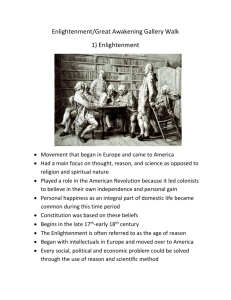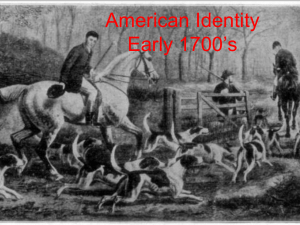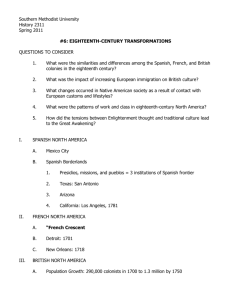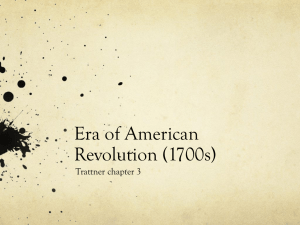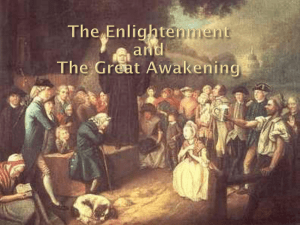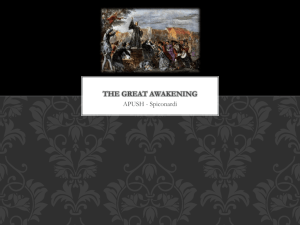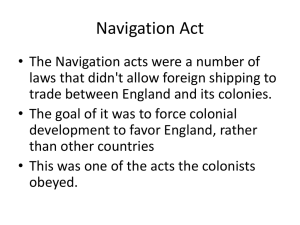OfthePeople_Ch05
advertisement
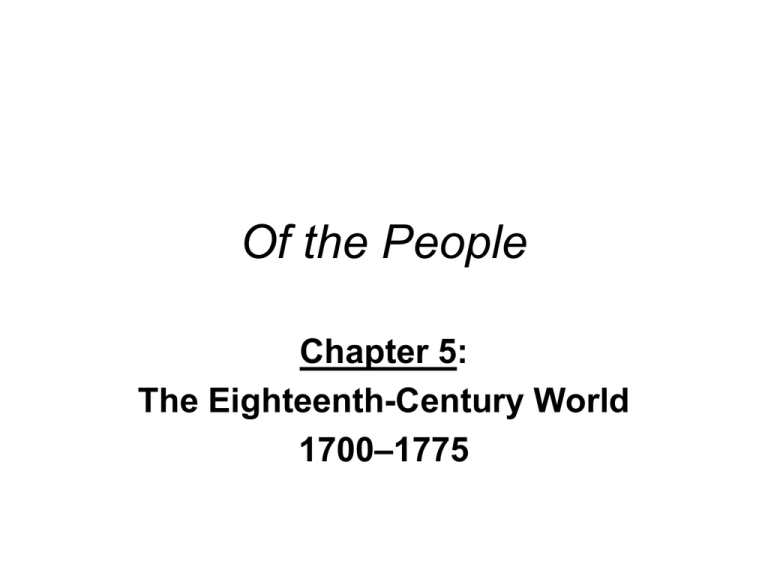
Of the People Chapter 5: The Eighteenth-Century World 1700–1775 Common Threads >> What were the some of the choices that individual men and women made in the eighteenth century— for example, where to live, how to work, what to purchase, what to believe—and how did those choices affect their society? >> How did such choices make everyday life more democratic? What were the forces that worked against such democratization? >> How were free Americans able to become wealthier even without significant technological innovations? >> How did the consumer revolution affect American society and culture? >> As the colonial population became more diverse and complex, with separate regional cultures and an increasing variety of beliefs and religious practices, were there other experiences that colonial Americans had in common? Is it possible yet, on the eve of the American Revolution, to talk about a common American experience or culture? THE EIGHTEENTH-CENTURY WORLD 1700-1775 • Overview – The Population Explosion of the Eighteenth Century – The Transatlantic Economy: Producing and Consuming – The Varieties of Colonial Experience – The Head and the Heart in America: The Enlightenment and Religious Awakening AMERICAN PORTRAIT George Whitefield: Evangelist for a Consumer Society “Whitefield embodied the great contradictions of his age without threatening the political or economic order that sustained them….Whitefield’s strategy was to criticize the individual without attacking the system.” – What was new and unique about Whitefield’s preaching? • Style • Message • Popular Following – Why was Whitefield such a hit sensation in the colonies? • Social Conditions The Population Explosion of the Eighteenth Century “This population boom was both the product of American prosperity and the precondition for its further growth.” • The Dimensions of Population Growth – Scope and scale – How did this expansion alter British North American society? • Ethnic makeup • Economic activity: consumerism • Bound for America: European Immigrants – Who were the European immigrants? • Origins • Destinations – Occupations The Population Explosion of the Eighteenth Century • Bound for America: African Slaves – The People • Origins • Destinations • Conditions: Captivity, Transport, and Occupations – What fueled the dramatic expansion of slavery in British North America? • The Great Increase of Offspring – General characteristics • Euro-American • African American – Circumstances (18th century) • Marriage practices • Health The Transatlantic Economy: Producing and Consuming “In the eighteenth century, as the colonies matured, they became capitalist societies, tied increasingly into an Atlantic trade network.” • The Nature of Colonial Economic Growth – What factors fueled this growth? • • • • Population Environment Labor Productivity What role, if any, did technological innovations play? – Who (what industries) benefited the most from this economic activity? • The least? The Transatlantic Political Economy: Producing and Consuming • The Transformation of the Family Economy – How did the family structure the economic activity of British North America? • Men: Husbands and Fathers • Women: Wives, Mothers, “Deputy Husbands” • Children: Sons and Daughters • Sources of Regional Prosperity – Economic regions of British North America • South: Tobacco, Cereals (Rice), and Indigo • Middle: Grains (Wheat) • North: Agriculture, Furs/Hides – How did labor compare? • How did slave life compare in the Chesapeake versus South Carolina? – Where was wealth concentrated in each of these regions? The Transatlantic Political Economy: Producing and Consuming • Merchants and Dependent Laborers in the Transatlantic Economy – Shipbuilding in New England – Major Port Towns: Boston, Newport, New York, Philadelphia, and Charleston • An affluent merchant class • Consumer Choices and the Creation of Gentility – What new “liberty” emerged for colonists as a result of the British mercantilist system? • Consumer Choice – Consumer Revolution • Causes • Social Impact The Varieties of Colonial Experience “Although the eighteenth-century industrial and consumer revolutions tied the peoples of the North Atlantic world together, climate, geography, immigration, patterns of economic development, and population density made for considerable variety.” • Creating an Urban Public Sphere – Scale and Scope of Urban Expansion – The Wealthy Class – Urban Dwellers • Social Life • Attitudes: Identity and Politics • The Diversity of Urban Life – How did the urban poor and black slaves react to the economic stratification of urban life? – What new racial laws emerged in New York and Charleston? • Why did they emerge? The Varieties of Colonial Experience • The Maturing of Rural Society – Pressures of Population Expansion • In rural New England, what new social patterns emerged in response? • The World That Slavery Made – White World versus Black World – How did the two worlds interrelate? • Sexual Relations • Hostilities – e.g., The Stono Rebellion, 1739 • Georgia: From Frontier Outpost to Plantation Society – What was the plan for Georgia? • James Oglethorpe’s Contribution – What was the long-term reality of the colony? The Head and the Heart in America: The Enlightenment and Religious Awakening “Although the movements might seem fundamentally opposite…both criticized established authority and valued the experience of the individual. Both contributed to the humanitarianism that emerged at the end of the century, and both were products of capitalism.” • The Ideas of the Enlightenment – How did the Enlightenment alter Europeans’ view of the world, and of knowledge in general? • What was the impact on “traditional” sources (institutions) of knowledge, such as the Bible (church)? • The Enlightenment and the Study of Political Economy – John Locke – Adam Smith • Enlightened Institutions – Libraries for the Public – How did Enlightenment optimism impact organized religions? The Head and the Heart in America: The Enlightenment and Religious Awakening • Origins of the Great Awakening – Ripe Conditions for an Awakening • The Grand Itinerant: George Whitfield – How did the Awakeners shake up the religious establishments of the colonies? • Cultural Conflict and Challenges to Authority – What was the widespread appeal of the Awakening? • What the Awakening Wrought – What was the new denominational divide created by the Awakening? • Conclusion – How did these two intellectual movements relate? • What became the distinguishing characteristic of American life as a result? – Individualism THE EIGHTEENTH-CENTURY WORLD 1700-1775 • Revisiting the Common Threads >> What were the some of the choices that individual men and women made in the eighteenth century—for example, about where to live, how to work, what to purchase, what to believe—and how did those choices affect their society? >> How did such choices make everyday life more democratic? What were the forces that worked against such democratization? >> How were free Americans able to become wealthier even without significant technological innovations? >> How did the consumer revolution affect American society and culture? >> As the colonial population became more diverse and complex, with separate regional cultures and an increasing variety of beliefs and religious practices, were there other experiences that colonial Americans had in common? Is it possible yet, on the eve of the American Revolution, to talk about a common American experience or culture?
